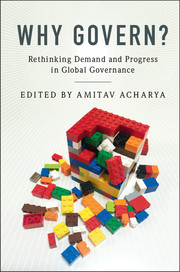Book contents
- Frontmatter
- Contents
- List of Figures
- List of Tables
- Notes on Contributors
- Acknowledgments
- List of Abbreviations
- 1 Rethinking Demand, Purpose and Progress in Global Governance: An Introduction
- Part I The Changing Concept of Global Governance
- 2 The Great Descent: ‘Global Governance’ in Historical and Theoretical Perspective
- 3 Who Is Liberal Now? Rising Powers and Global Norms
- 4 The Social Purposes of Global Governance
- Part II Issue Areas
- Bibliography
- Index
3 - Who Is Liberal Now? Rising Powers and Global Norms
from Part I - The Changing Concept of Global Governance
Published online by Cambridge University Press: 05 September 2016
- Frontmatter
- Contents
- List of Figures
- List of Tables
- Notes on Contributors
- Acknowledgments
- List of Abbreviations
- 1 Rethinking Demand, Purpose and Progress in Global Governance: An Introduction
- Part I The Changing Concept of Global Governance
- 2 The Great Descent: ‘Global Governance’ in Historical and Theoretical Perspective
- 3 Who Is Liberal Now? Rising Powers and Global Norms
- 4 The Social Purposes of Global Governance
- Part II Issue Areas
- Bibliography
- Index
Summary
Both critics and supporters of the existing international order equate American power and liberal norms with that order. This perspective inevitably awards a central role to the United States and its strategies in the creation and maintenance of a liberal global order. In some versions, the United States is the “indispensable nation”; any retrenchment of American power could fatally undermine the liberal international order. From this US-centric vantage point, rising powers, such as China, are often portrayed as free riding on American contributions that sustain the liberal order or, in more alarmist views, undermining that order through competing strategies, institutions or norms.
The assumption that US power and a liberal world order are closely linked also frames the maintenance of order as a supply-side problem: how can the architecture of global governance be maintained if US dominance declines and incentives for free riding grow? Rather than asking conventional questions about the supply of liberal governance in the absence of US power, however, the following analysis asks whether and where the demand for global liberal order originates in contemporary world politics. The argument proceeds in four parts, questioning the conventional equation of American power and a liberal world order at each step. First, liberal norms and principles are defined independently of US official preferences and policies. Second, the link between “indispensable” American power and liberal norms is questioned in three respects: Other societies played a role in creating and sustaining the post-1945 liberal order that is often ignored; some elements in that order were far from unalloyed embodiments of liberal norms; and the American variant of liberalism often failed to represent the spectrum of international liberal norms. The next section presents the emerging economies as embodiments of varieties of liberalism, an ideological spectrum that was substantially wider in the immediate post-1945 decades and now may widen again. The policies and normative allegiances of rising powers may redefine liberalism rather than challenging the liberal foundations of contemporary institutions. Finally, China represents a rising power that has accepted many existing global rules of the game without strong domestic normative anchors for supporting a liberal order. Whether a liberal international order can survive on the basis of Chinese interests rather than its normative alignment is a final, central question for the future of global institutions.
- Type
- Chapter
- Information
- Why Govern?Rethinking Demand and Progress in Global Governance, pp. 55 - 73Publisher: Cambridge University PressPrint publication year: 2016
- 5
- Cited by



